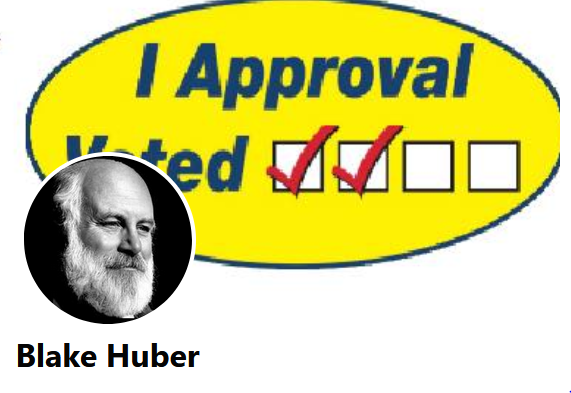Frank Atwood, Approval Voting Party 2020 VP and 2016 Presidential nomineeIn 2016 the Approval Voting Party ran Frank Atwood for President and Blake Huber for VP. They appeared on the ballot in Colorado.
In 2020 they have switched roles. Huber is the Presidential nominee and Atwood is the running-mate. Sort of a vice versa thing. Get it? "Vice" versa? My attempt at a political ticket joke. Sorry, couldn't resist.
Well, anyway.
In case you are wondering what the concept of Approval Voting is all about, on April 24 Mr. Huber sent me this nice summation in an email:
In a nutshell Approval Voting allows a voter to mark his ballot for more than one candidate with the candidate marked on the most ballots is the candidate that is elected. The voter can choose all the candidates she agrees with on issues or the ones that have the correct resume for the current election period instead of voting for only one candidate.
Currently each voter marks his ballot for only one candidate, often resulting in voting for the lesser of two evils, the voter also has to consider the concept of electability as a criteria for casting her single precious vote. This concept of vote for one and only one is an archaic concept and limits our choices.
Our efforts are designed to change the voting method to allow voters to honestly and sincerely select the candidates they support and to elect the candidate that has the broadest popular support.Earlier I interviewed Blake Huber with the same questions:
https://thirdpartysecondbananas.blogspot.com/2020/04/blake-huber-approval-voting-party-2016.html
I would like to thank Eric Bodenstab, VP nominee of the Unity Party of America, for helping me make contact with the Approval Voting Party. The following is my email interview with Frank Atwood, Approval Voting Party 2020 VP and 2016 Presidential nominee--
--------------------------------------------------------------
Q: From what I can ascertain, both of you have a history with the Libertarian Party in Colorado. Did that experience play a role in becoming activists for Approval Voting?
FA: Yes, in 1996, I discovered I was a Libertarian – being both fiscally responsible and socially accepting, the best of what both major parties say they advocate for. I took the Advocates for Self-Government's "World's Smallest Political Quiz" and realized for myself that as an individual who supported both marijuana decriminalization and Second Amendment rights, I had found a home in the Libertarian Party. For a decade I vigorously campaigned and advocated for Libertarian candidates watching their support deteriorate in the last month of campaigns from 15 to 5% usually because of the "wasted vote" argument.
Approval Voting - letting the voter vote for all the candidates he approves of, resolves this "wasted vote" dilemma by letting a voter express both his heart and mind. He can be honest with his heart and strategic with mind. Another voting possibility is: if he hates one of the candidates, be he / she a Donald or a Hilary, the voter can vote for everyone except that despised candidate.Q: I see there are Approval Voting groups in different parts of the United States, but you have decided to actually create an authentic and official political party as a vehicle for change. How did that choice come about?
FA: If you study Richard Winger's newsletter Ballot Access News, you'll see that Colorado was not practicing blatant ballot suppression in 2016 and we decided to use the ballot as a vehicle to promote Approval Voting. When in 2018 the legislature and governor tightened up ballot access we felt we needed to become a party.Q: Do you see yourselves as a single-issue party?
FA: Yes, we are. Election reform that successfully minimizes spoilers and sabotage, yet gives viability and visibility to alternative factions is too significant to dilute with any broader distractive agenda. Stay focused on the message: Election reform through Approval Voting.Q: Is Ranked Choice Voting an option worth promoting as well?
FA: Both Approval Voting and Ranked Choice Voting are far superior to our current system; however, a century of evidence in the Australian lower house shows RCV single winner method as perpetuating egregious two-party dominance. I acknowledge neither system promises victory to third parties, however Approval Voting will provide more transparent viability and visibility for third parties than RCV as evidenced in Australia's lower house over the past century.Q: One critique of Approval Voting I found read, "Approval voting violates 'one person, one vote' and is unconstitutional." How do you respond to that?
FA: I'll let my running mate Blake Huber discuss the technicalities. Already numerous voters in their municipal at-large elections are voting for more than one candidate.
Currently, we live with "One person, one ballot, vote for as many candidates as there are seats to be filled. The candidate(s) with the most votes wins." The Approval Voting Party is focusing on letting the citizen cast his vote for more than just a limited number of candidates. Approval Voting advocates supporting all the candidates the voter approves of. Q: What are the demographics of your support base? What part of the political spectrum do you think they are coming from? Are other third parties supporting your efforts at least in spirit?
FA: Our base is disgruntled disappointed voters trapped into voting for the lesser of two evils without the option of expressing themselves further. The American Solidarity Party, Libertarian Party and elements of the Natural Law Party advocate for Approval Voting. People are frustrated and they want a better voting system. Q: Are you experiencing any backlash to your ideas, and from where?
FA: The faction objecting most to voting method reform are unpopular incumbents scared that a voter will express support for a third party. This faction wants to control / limit / manipulate the outcome to perpetuate his own incumbency.Q: It is pretty rare to see the same nominees switch the Presidential and Vice-Presidential slots between elections. Lawrence Holmes and Gloria La Riva of the Workers World Party did that in 1992. How is that working out for you two?
FA: Quite well. Blake Huber is bringing fresh enthusiasm for the party. We expect to double our votes this coming year.Q: Any life lessons learned from the 2016 campaign that you are applying to the 2020 effort?
FA: Yes, when two such unpopular candidates still get 95% of the vote, without an alternative party getting beyond 4%, the system is broken and it is time for Approval Voting.Q: What sort of national and support network exists for proponents of Approval Voting?
FA: The most active think tank is The Center for Election Science. They continue to research other alternatives, yet find themselves continuing to support Approval Voting most recently in Fargo, ND, and through an initiative in St Louis.Q: How will you measure the success of your 2020 campaign?
FA: The campaign's success will be measured by more voters and candidates endorsing Approval Voting.Q: Where can interested voters contact you?
FA: The easiest way to reach the party is: our web site Approval Voting Party.com that takes you to our Facebook page, or phone / text 720/439-6000. I can be reached at 720/260-1493 or Frank.Atwood@Hotmail.com.
Q: Thank you very much for contributing to this project. Please feel free to add any additional information not covered by my questions.
FA: These paragraphs provide additional background to my political activism:
In the 2000 Bush / Gore presidential election the Nader campaign in Florida reminded me of the significance of spoilers and sabotage which may have prompted the book in 2008, Gaming the Vote why elections aren't fair and what can be done by William Poundstone. Reading that book and Honeybee Democracy by Thomas Sealey convinced me that the simplest best easy solution for voting reform was Approval Voting. Letting the voter vote for more than one candidate. Let the voter mark his ballot for all the candidates he approves of.
There are two very significant political quotes. The first is Churchill's: "Democracy is the worst form of government except for all the others". What's so good about democracy? The feedback loops! The governed express their opinions to the governing and choose who the governing will be. The exceptions are sometimes spoiler (e.g. Nader in 2000) or sabotage (Perot in 1992) distorting the will of the people.
The second quote is JFK's: "Those who make evolution impossible make revolution inevitable." How do we provide viability and visibility for alternative factions before they become violently revolutionary?
Approval Voting solves these problems. With approval voting if you want to vote for a Nader or a Perot, you can hedge your preference with voting for Gore or Bush to minimize the impact of a spoiler or saboteur. Also, by voting for Nader and Perot you the voter give viability and visibility to third parties and alternative ideas.
In summary, Approval Voting minimizes spoilers and sabotage for the established parties, yet provides viability and visibility for new alternative parties.
Historical speculation
However, democracy is about minimizing the trauma of political change and resolving crises peacefully. There are two famous quotes about democracy. The first from Winston Churchill: "Democracy is the worst form of government except for all the others." The second quote is from President Kennedy: "Those who make evolution impossible make revolution inevitable."
American History has two poster children of trauma: prohibition and slavery. One was resolved peacefully, the other with violence. Might mid-19th century statesmen have used Approval Voting to provide compromise and less violent binary choices to resolve the slavery issue?












